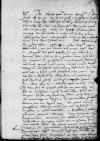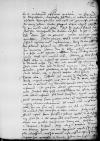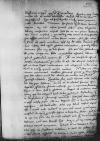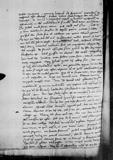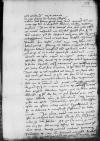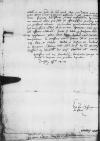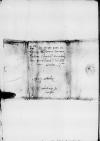List #1537
Cornelis DE SCHEPPER do Ioannes DANTISCUSBrussels, 1536-09-13
Regest polski:
De Schepper tłumaczy roczną przerwę w korespondencji z Dantyszkiem swoimi licznymi podróżami oraz pogłoskami o śmierci Dantyszka. Pogłoski te zdementował poseł gdańszczan, co zmobilizowalo De Scheppera do napisania.
Poprzedni list Dantyszka [IDL 1421] dotarł do Niderlandów pod nieobecność De Scheppera, który przebywał wówczas u króla Ferdynanda. Na jego dworze De Schepper spotkał posła króla polskiego [Zygmunta I] Piotra Opalińskiego, który opowiedział mu o poważnych kłopotach Dantyszka z kasztelanem(!) malborskim [Stanisławem Kostką]. Poseł ów udał się później do Italii.
Gdy De Schepper powrócił do Flandrii, przeczytał list od Dantyszka [IDL 1421], po czym zostawił go w Brugii, i wyruszył do Holandii. Od tego czasu nie udało mu się wrócić, toteż odpowiada na list pobieżnie, nie mając dostępu do tekstu.
Wiele wydarzyło się w sprawach duńskich, lecz De Schepper nie może podjąć obszernie tego tematu, gdyż już nazajutrz udaje się w kolejną podróż, nie wie jeszcze, czy do cesarza, czy też na wojnę z Francją. Zapewnia, że nic zmieni jego szacunku dla Dantyszka, choć z przyczyn politycznych nie wierzy w możliwość spotkania przyjaciela za życia.
De Schepper szczegółowo opisuje konflikt o miasto Appingedam we Fryzji. Miasto zostało zajęte przez Meinderta van Ham, zwolennika anabaptystów, znoszacego się z księciem Geldrii [Karolem II], księciem Holsztynu [Chrystianem III von Oldenburg] i Francuzami. Oblężonemu przez gubernatora prowincji Groningen Georga Schencka Hamowi w sukurs nadeszły posiłki od księcia Holsztynu, złożone w większości ze szlachty holsztyńskiej, saskiej i geldryjskiej. Zanim jednak dotarły one do Appingedam, zostały rozbite przez wojska Schencka pod dowództwem Godtschalka [Ericksena], po czym Appingedam poddało się. Przywódcy buntu – Ham oraz geldryjski landdrost Bernard van Hackfort – są jeńcami gubernatora Shcencka.
Oblężona Kopenhaga zwróciła się o posiłki do cesarza, toteż w Niderlandach przygotowano potężną flotę. W związku z tym przybył też do Brukseli książę Palatynatu Friedrich [II von Wittelsbach]. Okazja nie została jednak wykorzystana, gdyż Kopenhaga poddała się, podczas gdy wojsko zaangażowane było w wojnę z Francją oraz przy oblężeniu Appingedam. Ponieważ flota jest już gotowa i uzbrojona, piechota pod dowództwem pana de Beveren [Adolfa of Burgundy] i [Reinouda III] van Brederode mają się z nią przeprawić do Francji. Z ramienia cesarza do wyprawy maja dołączyć De Schepper i Godschalk [Ericksen].
De Schepper relacjonuje działania wojenne armii cesarskiej, która dotarła do Francji drogą lądową pod dowództwem hrabiego [Henryka] Nassau, hrabiego Roeulx [Adriaan van Croÿ] i pana Praet [Louis of Flanders]. Ciężkozbrojni żołnierze i machiny wojenne przestraszyły Francuzów, którzy pozamykali się w twierdzach. Te słabiej bronione, m.in. Guise, Bouchain, Clery sur Somme, zostały zdobyte z marszu, silniejsze pozostawiono za sobą. Obecnie, od około dwudziestu dni wojska cesarskie oblegają znakomicie ufortyfikowaną i wyposażoną twierdzę Péronne [nad Sommą], licząc na sprowokowanie Francuzów do walki w polu.
Książę Geldrii [Charles II od Guelders] utracił podczas tej wojny prowincję Groningen. W jego rękach pozostało tylko Drenthe – fragment diecezji utrechckiej z twierdzami Meppel, Coevorden i Wedda. Dowódcę Weddy i syna dowódcy Coevorden przekupił już Georg Schenck.
Król Francji utracił pierworodnego syna [Francis III de Valois], książę Orleanu [Henry II de Valois] ma kłopoty ze zdrowiem. Francja jest wyniszczana bardziej przez własnych żołnierzy, niż przez wrogów. Cesarz dotarł nad Rodan i podobno zdobył Arles.
De Schepper ubolewa nad złymi czasami i zagładą grożącą chrześcijaństwu. Zazdrości Dantyszkowi pozostawania z dala od centrum wydarzeń. Uważa, że gorliwszych i wierniejszych chrześcijan można obecnie znaleźć w Turcji, niż w Danii czy w Niemczech. Wątpi w możliwość zreformowania kościoła wobec powszechnej niezgody i wielkich sprzeczności w poglądach.
De Schepper komentuje pogłoskę o uwięzieniu duńskich biskupów i dostojników, z pomocą których książę Holsztynu [Christian III von Oldenburg] uzyskał władzę. Przypuszcza, że stało się to z przyczyn politycznych, jednakże postrzega takie traktowanie biskupów w krajach skandynawskich jako groźną dla religii tendencję, zwłaszcza po otrzymaniu wiadomości o wygnaniu biskupów ze Szwecji.
De Schepper zawiadamia Dantyszka, że w związku z wprowadzeniem powszechnego zakazu żeglugi Gdańszczanie wystosowali do królowej [Mary of Hungary] gwałtowny i nieuprzejmy list. Podkreśla, że zakaz cofnięto jeszcze przed nadejściem listu, i że nie był on wymierzony przeciw Gdańszczanom, gdyż dotyczył także Anglików, Portugalczyków, Szkotów, Hiszpanów i mieszkańców Niderlandów. Niektóre okręty (w tym jeden gdański) zostały – za wynagrodzeniem – zarekwirowane na potrzeby wojenne, pozostałe odesłano. Mimo że obraźliwy i lekceważący ton wspomnianego listu zdaje się sugerować wrogość gdańszczan wobec królowej i cesarza, De Schepper jest skłonny złożyć to na karb emocji wywołanych powszechnym niepokojem. Zarekwirowany gdański okręt został przeznaczony na dowódczy w wyprawie do Francji. Zdaniem De Scheppera jest to dla Gdańska raczej zaszczyt, niż despekt. Tymczasem otrzymał precyzyjne rozkazy, toteż wie już, że sam też popłynie na tym okręcie. Choć zdaje sobie sprawę z niebezpieczeństwa, jest dobrej myśli. Doradza Polsce sprzymierzać się z tą ze stron, która dąży do pokoju. Wierzy, że cesarz wyjdzie z konfliktu zwycięsko, wsparty finansowo i militarnie przez Niderlandy. Wskazują na to różne przepowiednie. Młodzież niderlandzka jest doskonale zaprawiona do służby wojskowej.
De Schepper życzyłby sobie przyjaźni pomiędzy Niderlandami i Polską, by móc bez wzbudzania podejrzeń korespondować z Dantyszkiem. Zaleca Dantyszkowi, aby dbał o zdrowie i cieszył się bliskością matki [Krystyny Schultze]. Sam opuszcza żonę [Elisabeth Donche] bliską porodu. Przekazuje Dantyszkowi pozdrowienia od niej.
Ze względu na niebezpieczne czasy De Schepper odłożył do wiosny realizację książkowych zamówień Dantyszka. Dantyszek może pisać do niego przez Fuggerów. Po powrocie z wyprawy ma zamiar spędzić zimę żoną. Siostra żony De Scheppera [Joanna Donche] i jego syn [Cornelis De Schepper jr.] oraz Miklos Oláh pozdrawiają Dantyszka. [Wolfgang] Haller jest w Austrii, arcybiskup Lund [Johan Weze] – na Węgrzech. De Schepper poleca się matce, siostrom i braciom Dantyszka, całej jego rodzinie oraz lokajowi.
| odebrano [1536]-10-16 Rękopiśmienne podstawy źródłowe:
Pomocnicze podstawy źródłowe:
Publikacje:
| ||||||||||||||
Tekst + aparat krytyczny + komentarz Zwykły tekst Tekst + komentarz Tekst + aparat krytyczny
 AAWO, AB, D.3, f. [1v] not numbered after 128
AAWO, AB, D.3, f. [1v] not numbered after 128
Reverendissimo in Christo Patri et Domino, domino
Iam annus est, ex quo neque ex me quicquam, neque ego ex te vicissim litterarum accepi. In causa fuit, ut reor, quod nescieris, ubinam locorum fuerim, afui orig. abfui⌈afuiafui orig. abfui⌉ enim ab hac aula[1] frequenter. cf.
Ego vero redii in
Plurima circa rem Danicam[3] erant, de quibus tecum quam paucissimis, abire enim rursus cogor cras atque haud scio, an ad
Novarum autem apud nos rerum quam plurimum est cotidie orig. quotidie⌈cotidiecotidie orig. quotidie⌉que emergit. Dum ego apud serenissimum  AAWO, AB, D.3, f. 125v
nomine venditabat, neque clam fuit, si conatus successisset, his regionibus grande periculum per illum instare occasiones inventurum quaslibet ad nocendum, sed provisum subito fuit. Priusquam tamen succurri potuit, munierat
AAWO, AB, D.3, f. 125v
nomine venditabat, neque clam fuit, si conatus successisset, his regionibus grande periculum per illum instare occasiones inventurum quaslibet ad nocendum, sed provisum subito fuit. Priusquam tamen succurri potuit, munierat
Gestum est id die quinta Augusti, quo tempore cum orig. qu[u]m⌈cumcum orig. qu[u]m⌉ obsessos speraremus deditionem facturos, frustrati spe sumus atque opinione diutius tenuerunt. Demum pertinacia victa est seque die sexta huius mensis dedidere iis pactis, ut milites incolumes relictis bonis armisque, virga alba tantum egrederentur, duces suos, hoc est praefatum  AAWO, AB, D.3, f. 126r
bat et anababtisticam resuscitare conabatur, et
AAWO, AB, D.3, f. 126r
bat et anababtisticam resuscitare conabatur, et
Parte alia illustres domini comites  AAWO, AB, D.3, f. 126v
ut minarum iraeque memor acie contendat. Sedere ante id oppidum iam diebus, ni fallor, viginti aut circiter bombardisque et machinis valde laceravere, nonnumquam tentantes, an per occasionem expugnare possent, sed non ita facile est inexpugnabili urbi atque instructissimae iugum inicere orig. iniicere⌈inicereinicere orig. iniicere⌉. Neque tamen Gallus adhuc aliquis comparuit. Iam instat hiems neque tamen remittit impetus nostrorum adeo, ut omnino videatur futurum, ut non nisi cum alterius partis excidio bellum finiatur.
AAWO, AB, D.3, f. 126v
ut minarum iraeque memor acie contendat. Sedere ante id oppidum iam diebus, ni fallor, viginti aut circiter bombardisque et machinis valde laceravere, nonnumquam tentantes, an per occasionem expugnare possent, sed non ita facile est inexpugnabili urbi atque instructissimae iugum inicere orig. iniicere⌈inicereinicere orig. iniicere⌉. Neque tamen Gallus adhuc aliquis comparuit. Iam instat hiems neque tamen remittit impetus nostrorum adeo, ut omnino videatur futurum, ut non nisi cum alterius partis excidio bellum finiatur.
Quocumque oculos corporis mentisque vertimus, plena omnia sunt tumultuum, seditionum, cladium, pavoris, infidelitatis, impietatis. Lugere lubet religionem nostram Christianam exstinctam orig. extinctam⌈exstinctamexstinctam orig. extinctam⌉ plane non ibi modo, quo vix loco umquam orig. unquam⌈umquamumquam orig. unquam⌉ fuit, sed ubique. Avaritiae, libidini nullus limes, nulla meta constituta, quo fit, ut vere diu praesagiverimus futura tempora, in quibus abesse quam adesse optandum foret magis. Tu interim in otio orig. ocio⌈otiootio orig. ocio⌉ tuo felix, si modo felicitas orig. foelicitas⌈felicitasfelicitas orig. foelicitas⌉ aliqua est multa videre, quae
 AAWO, AB, D.3, f. 127r
deplorare magis possis, quam emendare. Qualia, non dubito, multa tibi ob oculos obversari, etiamsi ab aula es remotissimus. Ego ab his scopulis nondum potui navim meam divertere, nimirum hoc saeculo orig. seculo⌈saeculosaeculo orig. seculo⌉, quod totum hominem requirit. Quod nisi nostra iuvenum adhuc opera, diligentia laboreque prospiciatur reipublicae, haud scio, an non plane deserenda erit navis custodia permittendaque vela ventis et tempestatibus. Quae res, ut patientius multa feram, monet. Sed haec alias.
AAWO, AB, D.3, f. 127r
deplorare magis possis, quam emendare. Qualia, non dubito, multa tibi ob oculos obversari, etiamsi ab aula es remotissimus. Ego ab his scopulis nondum potui navim meam divertere, nimirum hoc saeculo orig. seculo⌈saeculosaeculo orig. seculo⌉, quod totum hominem requirit. Quod nisi nostra iuvenum adhuc opera, diligentia laboreque prospiciatur reipublicae, haud scio, an non plane deserenda erit navis custodia permittendaque vela ventis et tempestatibus. Quae res, ut patientius multa feram, monet. Sed haec alias.
Venio ad tertium membrum cf.
Ad  AAWO, AB, D.3, f. 127v
de fide Christiana rerumque habenas ad fugitivos monachos et apostatas esse redactas. Quare valere sinamus regna illa cum suis toparchis, et nos, quae a maioribus nostris per manus accepimus, ea retineamus, in illis consenescamus, si modo Deus vitam annuerit.
AAWO, AB, D.3, f. 127v
de fide Christiana rerumque habenas ad fugitivos monachos et apostatas esse redactas. Quare valere sinamus regna illa cum suis toparchis, et nos, quae a maioribus nostris per manus accepimus, ea retineamus, in illis consenescamus, si modo Deus vitam annuerit.
En habes omnem seriem rerum, quae apud nos sunt.
Quae ad te scripta volui, nam
Quicquid tamen exinde sequetur, nos fortiter feremus, quibus magnitudo et fortuna  AAWO, AB, D.3, f. 128r
inulti peribimus atque, ut poeta ait,
cf. Verg. A. spargimus, et nostro sequitur de vulnere sanguis 12.51 ⌊et nostro sequitur de vulnere sanguiscf. Verg. A. spargimus, et nostro sequitur de vulnere sanguis 12.51 ⌋. Necdum adeo fortunae paenitet certique sumus
AAWO, AB, D.3, f. 128r
inulti peribimus atque, ut poeta ait,
cf. Verg. A. spargimus, et nostro sequitur de vulnere sanguis 12.51 ⌊et nostro sequitur de vulnere sanguiscf. Verg. A. spargimus, et nostro sequitur de vulnere sanguis 12.51 ⌋. Necdum adeo fortunae paenitet certique sumus
In summa, cuperem inter nos et vos amicitiam esse, ut nobis viris bonis liceat subinde sine suspicione orig. suspitione⌈suspicionesuspicione orig. suspitione⌉ mutuo per litteras fabulari. Quae, quo sit minus, per nos certe non stat, sed vos non desinitis ab expugnatione, quod aiunt,  AAWO, AB, D.3, f. 128v
clades in ore. Sed de his nimis, dum me detinet amor pacis, quam optare magis, quam sperare possumus.
AAWO, AB, D.3, f. 128v
clades in ore. Sed de his nimis, dum me detinet amor pacis, quam optare magis, quam sperare possumus.
Tu interim valetudinem hidden by binding⌈[nem]nem hidden by binding⌉ cura fruareque dulcissimae
Libros, quorum mentionem facis, nolui his iniquissimis temporibus ad te mittere. Proximo vere, quo sese hidden by binding⌈[e]e hidden by binding⌉ res efferent, videbimus. Scribe, si lubet, per
Salutat item te
Iterum vale, Domine et Pater ex animo honorande.
Ocissime orig. Ocyssime⌈OcissimeOcissime orig. Ocyssime⌉ ex
Eiusdem Reverendissimae Dominationis Vestrae ex animo inservitor, amicus hidden by binding⌈[us]us hidden by binding⌉ et filius
Postscript:
Dulcissimae
